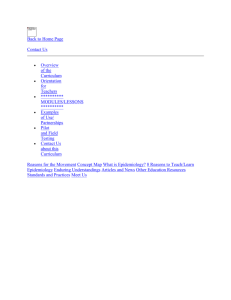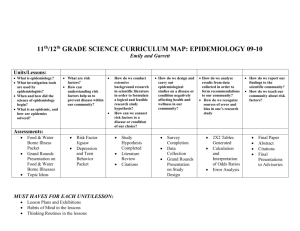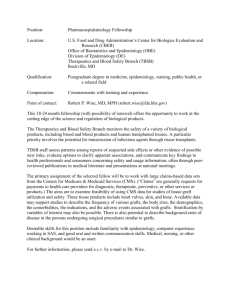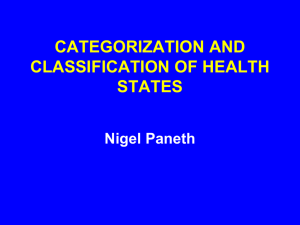Framework for Action - Epidemiology Education Movement
advertisement
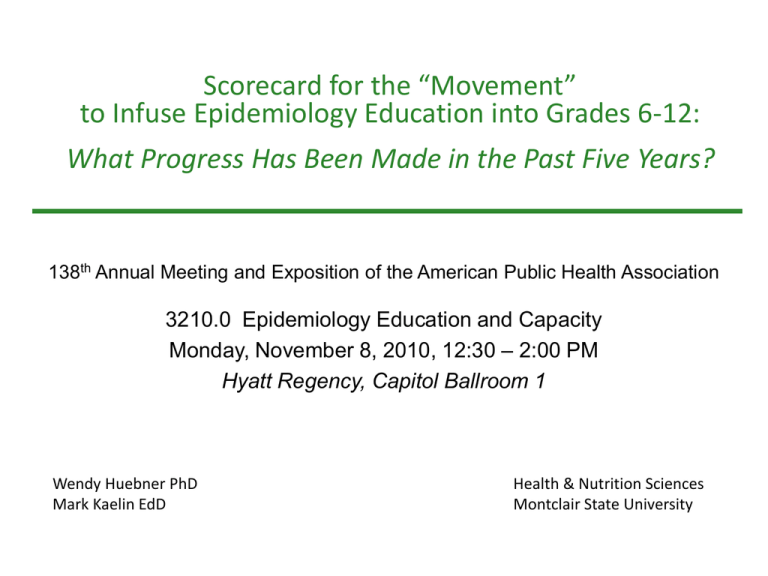
Scorecard for the “Movement” to Infuse Epidemiology Education into Grades 6-12: What Progress Has Been Made in the Past Five Years? 138th Annual Meeting and Exposition of the American Public Health Association 3210.0 Epidemiology Education and Capacity Monday, November 8, 2010, 12:30 – 2:00 PM Hyatt Regency, Capitol Ballroom 1 Wendy Huebner PhD Mark Kaelin EdD Health & Nutrition Sciences Montclair State University Presentation Overview 1. Public health and educational rationale for teaching epidemiology to students in grades 6-12. 2. What is the Epidemiology Education Movement? 3. 4. • Origins • Goals and Framework for Action Scorecard and Examples • Develop Curricula • Prepare Teachers • Create Demand • Maintain Momentum • Assess Short- and Long-Term Goals Conclusions and Discussion Why teach epidemiology to younger students? Middle School High School 3 Why teach epidemiology to younger students? Top 8 Reasons to Teach / Learn about Epidemiology 1. Empowers students to be scientifically literate participants in the democratic decision-making process concerning public health policy. 2. Empowers students to make more informed personal health-related decisions. 3. Increases students’ media literacy and their understanding of public health messages. 4. Increases students’ understanding of the basis for determining risk. 5. Improves students’ mathematical and scientific literacy. 6. Expands students’ understanding of scientific methods and develops their critical thinking skills. 7. Provides students with another mechanism for exploring important, real world questions about their health and the health of others. 8. Introduces students to an array of career paths related to the public’s health. . What is the Epidemiology Education Movement? Originated by a small group of epidemiologists and educators with a personal passion and professional interest in integrating epidemiology and other public health sciences into elementary and secondary schools Premise • If we define education as something that prepares people to live in their world, it should include giving people tools with which to make informed lifestyle and societal decisions that affect their health. • If people with common interests in K-12 epidemiology education were aware of each others' activities, we could move more quickly to critical mass and a step change 2005 – APHA Meeting • Presented at APHA 2005 to help introduce effort* * Presenters: Ralph Cordell, Centers for Disease Control and Prevention; David Fraser, College Board and the Robert Wood Johnson Foundation; Mark Kaelin and Wendy Huebner, Montclair State University 2005 – Examples in Curriculum Toolbox Goals and Framework for Action Develop Curricula Prepare Teachers Goals Infuse epidemiology education into curricula in grades 6-12 Create new curricula and enhance existing curricula Implement teacher training workshops in a variety of venues Improve scientific literacy Develop cadre of epidemiology curriculum developers Implement demonstration projects in a variety of school and non-school venues Increase the number of students preparing for careers in public health Evaluate curricula Maintain Momentum Create Demand Develop mechanisms to make people aware of the efforts of others (web site, newsletter, list serve) Infuse into educational structure (state / national standards, standardized testing, textbooks) Develop mechanisms to focus and coordinate efforts of many interested but busy stakeholders Obtain support of stakeholders (educators, epidemiologists, public health community, professional organizations, scientific journals, government) Assess Short- and Long-Term Goals Framework for Action Develop Curricula Prepare Teachers Create Demand Next: Scorecard and examples . . . Maintain Momentum Assess Outcomes Framework for Action Develop Curricula Create new curricula and enhance existing curricula Develop cadre of epidemiology curriculum developers Prepare Teachers Create Demand Maintain Momentum Assess Outcomes Evaluate curricula Examples: 1. New curricula for middle and high school 2. Science Olympiad trial event Framework for Action Develop Curricula Prepare Teachers 1. New curriculum for high school Create Demand Maintain Momentum Assess Outcomes http://www.montclair.edu/drugepi/ Framework for Action Develop Curricula Prepare Teachers 1. New curriculum for middle school Create Demand Maintain Momentum Assess Outcomes (Under development) National Center for Research Resources (NCRR) National Institutes of Health (NIH) Framework for Action Develop Curricula Prepare Teachers 2. Science Olympiad trial event Based on authentic assessments, as realistic as possible, complex experiences that allow opportunities for rehearsal, practice, consultation, feedback, and refinement Create Demand Maintain Momentum Assess Outcomes Hypothesis: Authentic epidemiology assessments will capture students’ attention and challenge their scientific reasoning Goal: To have students learn, do, and get excited about epidemiology Rationale: Science competitions provide an alternate venue for introducing non-traditional content and/or learning experiences http://www.njscienceolympiad.org/content/events/c/websites/epidemiology/index.html 2010 S0 Epi Challenge Event Overview • A high school trial event in New Jersey, for which points were awarded at both the regional and state competitions • Epi Challenge format – Teams of four students tested a hypothesis by conducting an epidemiological study in their school district – Each team selected their own health-related hypothesis among several choices of exposures and outcomes to study – Teams submitted detailed proposals and other materials according to instructions and templates – Regional competition: scoring and ranking of study proposals – State competition: presentation of study results in a poster session, with assessment by 10 epidemiologist judges 2010 S0 Epi Challenge Event Ethics training required of all team members: NIH online training in research ethics 2010 NJ State Finals 2010 NJ State Finals 2010 NJ State Finals 2010 NJ State Finals 2010 NJ State Finals 2010 NJ State Finals Think Like an Epidemiologist Challenge New Jersey Science Olympiad, March 16, 2010 Name School Thank you for stepping up, being a pioneer, and competing in the first Think Like an Epidemiologist Challenge trial event. You worked with others, developed epidemiologic knowledge and skills, and used judgment and innovation to actually "do" epidemiology under pressure. We hope you enjoyed the challenge. Detectives in the Classroom Teach Epidemiology Robert Wood Johnson Foundation Special thanks to the Epidemiology Section of the American Public Health Association for allowing us to distribute their Section pins to the student participants in the 2010 Think Like an Epidemiologist Challenge. Framework for Action Develop Curricula Implement teacher training workshops in a variety of venues Implement demonstration projects in a variety of school and non-school venues Prepare Teachers Create Demand Maintain Momentum Assess Outcomes Examples: 1. Teach Epidemiology professional development workshops 2. Social Networking of Teach Epidemiology alumni to develop lessons from current news stories 3. Demonstration projects Framework for Action Develop Curricula 1. Teach Epidemiology • Professional development workshops to increase use of Young Epidemiology Scholars (YES) teaching units supported by the Robert Wood Johnson Foundation (RWJF) Prepare Teachers Create Demand Maintain Momentum Assess Outcomes • Over the past four years, fourteen workshops have been held for more than 250 teachers • Workshops feature YES Teaching Units and other epidemiology curricula • Held by an educator and an epidemiologist, workshops include: Learning epidemiological concepts Observing epidemiology lessons for students Hands-on teaching experience o Create and teach new epidemiology lessons o Teach existing epidemiology lessons o Infuse epidemiology into existing lesson about something else o View a news item from an epidemiologic perspective http://www.teachepidemiology.org/ Teach Epidemiology CDC Global Odyssey Museum, Atlanta 2010 Teach Epidemiology Incline Village, NV 2010 Framework for Action Develop Curricula 2. Social networking of Teach Epidemiology alumni to develop “real time” lessons Prepare Teachers Create Demand Maintain Momentum Assess Outcomes “Bed Bugs Found at Times Square Movie Theater” To understand something as a specific instance of a more general case … is to have learned not only a specific thing but also a model for understanding other things like it that one may encounter. Framework for Action Develop Curricula 3. Demonstration Projects Prepare Teachers Create Demand Maintain Momentum Assess Outcomes After-School Epidemiology and Public Health Club Middletown (PA) Area High School “The Descriptive Epidemiology of Absenteeism” Epidemiology Camp, Clarion, PA Framework for Action Develop Curricula 3. Demonstration Projects Prepare Teachers Create Demand Maintain Momentum Assess Outcomes Creating a Public Health School-to-Career Path in four Newark (NJ) high schools that motivates them toward public health fields Framework for Action Develop Curricula Infuse into educational structure (state / national standards, standardized testing, textbooks) Prepare Teachers Create Demand Maintain Momentum Assess Outcomes Obtain support of stakeholders (educators, epidemiologists, public health community, professional organizations, scientific journals, government) Examples: 1. Georgia standards for high school epidemiology course 2. Professional meetings Framework for Action Develop Curricula 1. Georgia standards for high school epidemiology course Prepare Teachers Create Demand Maintain Momentum Assess Outcomes Georgia is the first state to offer epidemiology at the high school level. Standards have been developed for creation of curricula so that can students can study epidemiology. Taking an epidemiology course will meet state science requirements. https://www.georgiastandards.org/Standards/Pages/BrowseStandards/ ScienceStandards9-12.aspx Framework for Action Develop Curricula 2. Professional Meetings • American Public Health Association (APHA) Meetings - 2005-2010 • New Jersey Science Convention (NJSTA) Prepare Teachers Create Demand Maintain Momentum Assess Outcomes • Council of State and Territorial Epidemiologists (CSTE) • 2006 North American Congress of Epidemiology • Consensus Conference on Undergraduate Public Health Education, Boston University School of Public Health • National Science and Technology Week annual event held by the National Resources Canada (NRCan) • Public Health Education Stakeholders Meeting – Penn State Hershey College of Medicine Framework for Action Develop Curricula Develop mechanisms to make people aware of the efforts of others (website, newsletter, list serve) Develop mechanisms to focus and coordinate efforts of many interested but busy stakeholders Examples: 1. Website 2. Publications Prepare Teachers Create Demand Maintain Momentum Assess Outcomes http://www.epiedmovement.org/index.htm Framework for Action Develop Curricula 2. Publications “Epidemiology and Education: Using Public Health for Teaching Mathematics and Science” DF Stroup and SB Thacker. Public Health Reports, 2007; Vol 122 “Epidemiology, the basic science of public health, provides a compelling and relevant context for teaching science and mathematics ... and is an avenue for enabling students to grasp the relevance of real-world application of mathematics and science …” “Professional Development for Prospective Epidemiology Teachers in Grades 6-16: What Will We Do?" M Kaelin, W Huebner, R Cordell, B Szklarczuk. Public Health Reports 2008 Supplement 2, Vol 123. Prepare Teachers Create Demand Maintain Momentum Assess Outcomes Framework for Action Develop Curricula Prepare Teachers Perform assessments of short-term outcomes (e.g., knowledge in epidemiology, problem-solving skills) Create Demand Maintain Momentum Assess Outcomes Perform assessments of key longterm metrics of success (e.g., time trends in science scores, science enrollment, careers) Examples: 1. Funding organizations are urging more rigorous evaluations 2. Collaboration, communication, and mutual interest among stakeholders Framework for Action Develop Curricula Prepare Teachers 1. Funding organizations are urging more rigorous evaluations Science Education Partnership Awards (SEPA) Create Demand Maintain Momentum Assess Outcomes (from the National Center for Research Resources (NCRR), part of the National Institutes of Health (NIH) • SEPA has increased evaluation requirements in recent years • SEPA is supporting the development/testing of an instrument to measure scientific literacy, for use in one project and potential use in other future projects The Institute of Educational Sciences (IES) (part of the US Department of Education) • IES sets high standards of evaluation in separate grants to address “Efficacy and Replication” projects. (Efficacy is defined as “the degree to which an intervention has a net positive impact on the outcomes of interest in relation to the program or practice to which it is being compared.”) Framework for Action Develop Curricula Prepare Teachers 2. Collaboration, communication, and mutual interest among stakeholders Create Demand Maintain Momentum Assess Outcomes Pathways have developed and strengthened since 2005 Science Olympiad Teach Epidemiology (RWJF) Epi Monitor Georgia Department of Education Curriculum Developers in SEPA Program NJ Office of Career and Technical Education CDC Science Education and Professional Development Program Office Epidemiology Section of APHA CDC Global Health Odyssey Museum Young Epidemiology Scholars (YES) Competition (RWJF) Newark Public Schools Penn State Hershey College of Medicine Framework for Action Develop Curricula In conclusion . . . Prepare Teachers Do you feel the “Movement?” Create Demand How can we meet the continuing challenges? Assess Outcomes • • • • Maintain Momentum Finding “room” in classrooms / alternate venues Teacher outreach and follow-up Standards in more states Short- and long-term evaluations
